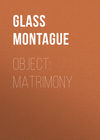Читать книгу: «Elkan Lubliner, American», страница 3
Miss Holzmeyer's temper mounted with each repetition of her surname, and her final "Step this way, please!" was uttered in tones fairly tremulous with rage.
Elkan obeyed so leisurely that by the time Mrs. Feinermann and he had reached the rear of the showroom Miss Holzmeyer had hung three dresses on the back of a chair.
"H'allow me," Elkan said as he took the topmost gown by the shoulders and held it up in front of him. He shook out the folds and for more than five minutes examined it closely.
"I didn't want to see nothing for seventeen-fifty," he announced at last – "especially from last year's style."
"What do you mean?" Miss Holzmeyer cried angrily. "That dress is marked twenty-eight dollars and it just came in last week. It's a very smart model indeed."
"The model I don't know nothing about," Elkan replied, "but the salesman must of been pretty smart to stuck you folks like that."
He subjected another gown to a careful scrutiny while Miss Holzmeyer sought the showcases for more garments.
"Now, this one here," he said, "is better value. How much you are asking for this one, please?"
Miss Holzmeyer glanced at the price ticket.
"Twenty-eight dollars," she replied, with an indignant glare.
Elkan whistled incredulously.
"You don't tell me," he said. "I always heard it that the expenses is high uptown, but even if the walls was hung mit diamonds yet, Miss Holzmeyer, your bosses wouldn't starve neither. Do you got maybe a dress for twenty-eight dollars which it is worth, anyhow, twenty-five dollars?"
This last jibe was too much for Miss Holzmeyer.
"Mis-ter Lap-in!" she howled, and immediately a glazed mahogany door in an adjoining partition burst open and Max Lapin appeared on the floor of the showroom.
"What's the matter?" he asked.
Miss Holzmeyer sat down in the nearest chair and fanned herself with her pocket handkerchief.
"This man insulted me!" she said; whereat Max Lapin turned savagely to Elkan.
"What for you are insulting this lady?" he demanded as he made a rapid survey of Elkan's physical development. He was quite prepared to defend Miss Holzmeyer's honour in a fitting and manly fashion; but, during the few seconds that supervened his question, Max reflected that you can never tell about a small man.
"What d'ye mean insult this lady?" Elkan asked stoutly. "I never says a word to her. Maybe I ain't so long in the country as you are, but I got just so much respect for the old folks as anybody. Furthermore, she is showing me here garments which, honest, Mister – er – "
"Lapin," Max said.
"Mister Lapin, a house with the reputation of Appenweier & Murray shouldn't ought to got in stock at all."
"Say, lookyhere, young feller," Lapin cried, "what are you driving into anyway? I am buyer here, and if you got any kick coming tell it to me, and don't go insulting the salesladies."
"I ain't insulted no saleslady, Mr. Lapin," Elkan declared. "I am coming here to buy for my wife a dress and certainly I want to get for my money some decent value; and when this lady shows me a garment like this" – he held up the topmost garment – "and says it is from this year a model, understand me, naturally I got my own idees on the subject."
Lapin looked critically at the garment in question.
"Did you get this style from that third case there, Miss Holzmeyer?" he asked, and Miss Holzmeyer nodded.
"Well, that whole case is full of leftovers and I don't want it touched," Lapin said. "Now go ahead and show this gentleman's wife some more models; and if he gets fresh let me know – that's all."
"One minute, Mr. Lapin," Elkan said. "Will you do me the favour and let me show you something?"
He held up the garment last exhibited by Miss Holzmeyer and pointed to the yoke and its border.
"This here garment Miss Holzmeyer shows me for twenty-eight dollars, Mr. Lapin," he said, "and with me and my wife here a dollar means to us like two dollars to most people, Mr. Lapin. So when I am seeing the precisely selfsame garment like this in Fine Brothers' for twenty-six dollars, but the border is from silk embroidery, a peacock's tail design, and the yoke is from gilt net yet, understand me, I got to say something – ain't it?"
Lapin paused in his progress toward his office and even as he did so Elkan's eyes strayed to a glass-covered showcase.
"Why, there is a garment just like Fine Brothers' model!" he exclaimed.
"Say, lookyhere!" Lapin demanded as he strode up to the showcase and pulled out the costume indicated by Elkan. "What are you trying to tell me? This here model is thirty-seven dollars and fifty cents; so, if you can get it for twenty-six at Fine Brothers', go ahead and do it!"
"But, Mr. Lapin," Elkan said, "that ain't no way for a buyer of a big concern like this to talk. I am telling you, so sure as you are standing there and I should never move from this spot, the identical selfsame style Fine Brothers got it for twenty-six dollars. I know it, Mr. Lapin, because we are making up that garment in our factory yet, and Fine Brothers takes from us six of that model at eighteen-fifty apiece."
At this unguarded disclosure Lapin's face grew crimson with rage.
"You are making it up in your factory!" he cried. "Why, you dirty faker you, what the devil you are coming round here bluffing that you want to buy a dress for your wife for?"
Elkan broke into a cold perspiration and looked round for Mrs. Feinermann, the substantial evidence of his marital state; but at the very beginning of Max Lapin's indignant outburst she had discreetly taken the first stairway to the right.
"Bring that woman back here!" Max roared. Miss Holzmeyer made a dash for the stairway, and before Elkan had time to formulate even a tentative plan of escape she had returned with her quarry.
"What do you want from me?" Mrs. Feinermann gasped. Her hat was awry, and what had once been a modish pompadour was toppled to one side and shed hairpins with every palsied nod of her head. "I ain't done nothing!" she protested.
"Sure, you ain't," Elkan said; "so you should keep your mouth shut – that's all."
"I would keep my mouth shut oder not as I please," Mrs. Feinermann retorted. "Furthermore, you ain't got no business to get me mixed up in this Geschichte at all!"
"Who are you two anyway?" Max demanded.
"This here feller is a young feller by the name of Elkan Lubliner which he is working by Polatkin & Scheikowitz," Mrs. Feinermann announced; "and what he is bringing me up here for is more than I could tell you."
"Ain't he your husband?" Max asked.
"Oser a Stück!" Mrs. Feinermann declared fervently. "A kid like him should be my husband! An idee!"
"That's all right," Elkan rejoined. "Im Russland at my age many a young feller is got twins yet!"
"What's that got to do with it?" Max Lapin demanded.
"It ain't got nothing to do with it," Elkan said, "but it shows that a young feller like me which he is raised in the old country ain't such a kid as you think for, Mr. Lapin. And when I am telling you that the concern which sells you them goods to retail for twenty-eight dollars is sticking you good, understand me, you could take my word for it just the same like I would be fifty-five even."
Again he seized one of the garments.
"And what's more," he went on breathlessly, "the workmanship is rotten. Look at here! – the seams is falling to pieces already!"
He thrust the garment under Lapin's nose with one hand, while with the other he dug down into his trousers pocket.
"Here!" he shouted. "Here is money – fifty dollars!"
He dropped the gown and held out a roll of bills toward Lapin.
"Take it!" he said hysterically. "Take it all; and if I don't bring you to-morrow morning, first thing, this same identical style, only A-number-one workmanship, which you could retail for twenty dollars a garment, understand me, keep the money and fertig."
At this juncture the well-nourished figure of Louis Appenweier, senior member of Appenweier & Murray, appeared in the door of the elevator and Max Lapin turned on his heel.
"Come into my office," he hissed; and as he started for the glazed mahogany door he gathered up the remaining garments and took them with him.
For more than half an hour Elkan and Max Lapin remained closeted together, and during that period Elkan conducted a clinic over each garment to such good purpose that Max sent out from time to time for more expensive styles. All of these were in turn examined by Elkan, who recognized in at least six models the designs of Joseph Redman, slightly altered in the stealing by Leon Sammet.
"Yes, Mr. Lapin," Elkan said, "them models was all designed by our own designer and some one ganvered 'em on us. Furthermore, I could bring you here to-morrow morning at eight o'clock from our sample racks these same identical models, with the prices on 'em marked plain like the figures on a ten-dollar bill, understand me; and if they ain't from twenty to thirty per cent. lower as you paid for these here garments I'd eat 'em!"
For at least ten minutes Max Lapin sat with knitted brows and pondered Elkan's words.
"Eight o'clock is too early," he announced at last. "Make it half-past nine."
"Six, even, ain't too early for an up-to-date buyer to look at some genuine bargains," Elkan insisted; "and, besides, I must got to get back to the shop at nine."
"But – " Lapin began.
"But nothing, Mr. Lapin," Elkan said, rising to his feet. "Make it eight o'clock, and the next time I would come round at half-past nine."
"What d'ye mean the next time?" Lapin exclaimed.
"I mean this wouldn't be the last time we do business together, because the job as assistant cutter which I got it is just temporary, Mr. Lapin," he said as he started for the door – "just temporary – that's all."
He paused with his hand on the doorknob.
"See you at eight o'clock to-morrow morning," he said cheerfully; and five minutes later he was having hard work to keep from dancing his way down Thirty-third Street to the subway.
From half-past seven in the morning until six at night were the working hours of all Polatkin & Scheikowitz's employees, save only Sam Markulies, the shipping clerk, whose duty it was to unlock the shop at quarter-past seven sharp. This hour had been fixed by Philip Scheikowitz himself, who, on an average of once a month, would stroll into the shipping department at closing-time and announce his intention of going to a wedding that evening. Sometimes the proposed excursion was a pinocle party or a visit to the theatre, but the dénouement was always the same. The next morning Scheikowitz would arrive at the factory door precisely at quarter-past seven to find Markulies from five to ten minutes late; whereupon Markulies would receive his discharge, to take effect the following Saturday night – and for the ensuing month his punctuality was assured.
During the quarter of an hour which preceded the arrival of the other employees, Markulies usually dusted the office and showroom; and on the morning following Elkan's holiday this solitary duty was cheered by the presence of Harry Flaxberg. Harry had sought the advice of counsel the previous day and had been warned against tardiness as an excuse for his discharge; so he was lounging on the sidewalk long before Markulies's arrival that morning.
"Nu, Mr. Flaxberg," Markulies cried, "what brings you round so early?"
"I couldn't sleep last night," Flaxberg said; "so I thought I might just so well be here as anywhere."
"Ain't that the funniest thing!" Markulies cried. "Me I couldn't sleep neither. I got something on my mind."
He unlocked the door as he spoke; and as he passed up the stairs he declared again that he had something on his mind.
"Yow!" Flaxberg said. "I should got your worries, Markulies. The simple little things which a shipping clerk must got to do would oser give anybody the nervous prostration."
"Is that so?" Markulies retorted. "Well, I ain't just the shipping clerk here, Mr. Flaxberg. You must remember I am in charge with the keys also, Mr. Flaxberg; and I got responsibilities if some one ganvers a couple sample garments once in a while, y'understand – right away they would accuse me that I done it."
"Don't worry yourself, Markulies," Flaxberg said. "I ain't going to ganver no garments on you – not this morning anyhow."
"You I ain't worrying about at all," Markulies rejoined; "but that young bloodsucker, Lubliner, Mr. Flaxberg – that's something else again. Actually that young feller is to me something which you could really call a thorn in my pants, Mr. Flaxberg. Just because he is assistant cutter here and I am only the shipping clerk he treats me like I would be the dirt under his feet. Only last night, Mr. Flaxberg, I am locking up the place when that feller comes up the stairs and says to me I should give him the key, as he forgets a package which he left behind him. Mind you, it is already half-past six, Mr. Flaxberg; and ever since I am living up in the Bronix, Mr. Flaxberg, I am getting kicked out of six places where I am boarding on account no respectable family would stand it, Mr. Flaxberg, that a feller comes, night after night, nine o'clock to his dinner."
"You was telling me about Lubliner," Flaxberg reminded him.
"Sure, I know," Markulies continued. "So I says to him the place is closed and that's all there is to it. With that, Mr. Flaxberg, the feller takes back his hand – so – and he gives me a schlag in the stummick, which, honest, if he wouldn't be from Mr. Polatkin a relation, Mr. Flaxberg, I would right then and there killed him."
For two minutes he patted gently that portion of his anatomy where Elkan's blow had landed.
"He's a dangerous feller, Mr. Flaxberg," he went on, "because, just so soon as he opens the door after I am giving him the key, Mr. Flaxberg, he shuts it in my face and springs the bolt on me, Mr. Flaxberg – and there I am standing bis pretty near eight o'clock, understand me, till that feller comes out again. By the time I am at my room on Brook Avenue, Mr. Flaxberg, the way Mrs. Kaller speaks to me you would think I was a dawg yet. How should I know she is getting tickets for the theaytre that evening, Mr. Flaxberg? And anyhow, Mr. Flaxberg, if people could afford to spend their money going on theaytre, understand me, they don't need to keep boarders at all – especially when I am getting night after night boiled Brustdeckel only. I says to her, 'Mrs. Kaller,' I says to her, 'why don't you give me once in a while a change?' I says – "
"Did Lubliner have anything with him when he came out?" Flaxberg interrupted.
"Well, sure; he'd got the package he forgets, and how a feller could forget a package that size, Mr. Flaxberg – honestly, you wouldn't believe at all! That's what it is to be a relation to the boss, Mr. Flaxberg. If I would got such a memory, understand me, I would of been fired long since already. Yes, Mr. Flaxberg, I says to Mrs. Kaller, 'For three and a half dollars a week a feller should get night after night Brustdeckel– it's a shame – honest!' I says; and —stiegen! There's Mr. Scheikowitz!"
As he spoke he seized a feather duster and began to wield it vigorously, so that by the time Philip Scheikowitz reached the showroom door a dense cloud of dust testified to Markulies's industry.
"That'll do, Sam!" Philip cried. "What do you want to do here – choke us all to death?"
Gradually the dust subsided and disclosed to Philip's astonished gaze Harry Flaxberg seated on a sample table and apparently lost in the perusal of the Daily Cloak and Suit Record.
"Good-morning, Mr. Scheikowitz," he said heartily, but Philip only grunted in reply. Moreover, he walked hurriedly past Flaxberg and closed the office door behind him with a resounding bang, for he, too, had sought the advice of counsel the previous evening; and on that advice he had left his bed before daylight, only to find himself forestalled by the wily Flaxberg. Nor was his chagrin at all decreased by Polatkin, who had promised to meet his partner at quarter-past seven. Instead he arrived an hour later and immediately proceeded to upbraid Scheikowitz for Flaxberg's punctuality.
"What do you mean that feller gets here before you?" he cried. "Didn't you hear it the lawyer distinctively told you you should get here before Flaxberg, and when Flaxberg arrives you should tell him he is fired on account he is late? Honestly, Scheikowitz, I don't know what comes over you lately the way you are acting. Here we are paying the lawyer ten dollars he should give us an advice, understand me, and we might just so well throw our money in the streets!"
"But Flaxberg wasn't late, Polatkin," Scheikowitz protested. "He was early."
"Don't argue with me, Scheikowitz," Polatkin said. "Let's go outside and talk to him."
Philip shrugged despairingly as they walked to the office door.
"Flaxberg," he began as he discerned the city salesman again using a sample table for a footstool, "don't let us disturb you if you ain't through reading the paper yet."
"Yes, Flaxberg," Polatkin added, "you could get down here so early like you would be sleeping in the place all night yet, and what is it? Take from the table the feet, Flaxberg, and be a man. We got something to say to you."
"Go ahead, Mr. Polatkin," Flaxberg said as he leisurely brought his feet to the floor. "I'm listening."
"In the first place, Flaxberg," Polatkin said, "did it ever occur to you that, even if your uncle would got fired up to Appenweier & Murray's, Redman designs for us a line of garments here which them people might be interested in anyhow?"
"Yow, they would be interested in our line!" Flaxberg cried. "Lapin wouldn't buy only Sammet Brothers' line if we got Worth and Paquin both working for us as designers. You couldn't convince him otherwise, Mr. Polatkin."
"That's all right," Polatkin went on; "but it wouldn't do no harm for you to anyhow see the feller and show him a couple garments which we got it here. Take for instance them 1080's, which we are selling Fine Brothers, oder that 2060 – that overskirt effect with the gilt net yoke and peacock-feather-design braid, Flaxberg. Them two styles made a big hit, Flaxberg. They are all hanging on that end rack there, Flaxberg, and you could look at 'em for yourself."
Polatkin walked across the showroom to the rack in question.
"Especially the 2060's," he said as he pulled aside the heavy denim curtain which protected the contents of the rack, "which you could really say is – "
Here he paused abruptly – for, with the exception of a dozen wooden hangers, the rack was empty.
"What's this, Scheikowitz?" he cried with a sweep of his hand in the direction of the rack. "Where is all them 1080's and 2060's?"
Hastily the two partners examined every rack in the showroom; and not only did they fail to discover the missing samples, but they ascertained that, in addition, seven other choice styles had disappeared.
"See maybe is Redman using 'em in the cutting room," Scheikowitz suggested; and forthwith they made a canvass of the cutting room and factory, in which they were joined by Markulies.
"What is the matter, Mr. Scheikowitz?" he asked.
"We are missing a dozen sample garments," Scheikowitz replied.
"Missing!" Markulies loudly exclaimed. "What d'ye mean – missing, Mr. Scheikowitz? Last night, when I was covering up the racks, everything was in place."
Suddenly a wave of recollection swept over him and he gave tongue like a foxhound.
"Oo-oo-ee!" he wailed and sank into the nearest chair.
"Markulies," Polatkin cried out, "for Heaven's sake, what is it?"
"He must of ganvered 'em!" Markulies wailed. "Right in front of my eyes he done it."
"Who done it?" Scheikowitz cried.
"Lubliner," Markulies moaned.
"Lubliner!" Polatkin cried. "Do you mean Elkan Lubliner?"
"That's what I said," Markulies went on. "Comes half-past six last night, and that ganef makes me a schlag in the stummick, Mr. Polatkin; and the first thing you know he goes to work and steals from me my keys, Mr. Polatkin, and cleans out the whole place yet."
"Lubliner was here last night after we are going home?" Polatkin asked.
"Sure, he was," Markulies replied – "at half-past six yet."
"Then that only goes to show what a liar you are," Polatkin declared, "because myself I am letting Elkan go home at one o'clock on account the feller is so sick, understand me, he could hardly walk out of the place at all. Furthermore, he says he is going right straight to bed when he leaves here; so, if you want to explain how it is the garments disappear when you are in the place here alone, Markulies, go ahead with your lies. Might Mr. Scheikowitz stole 'em maybe – or I did! What?"
Markulies began to rock and sway in an agony of woe.
"I should never stir from this here chair, Mr. Polatkin," Markulies protested, "and my mother also, which I am sending her to Kalvaria – regular like clockwork – ten dollars a month, she should never walk so far from here bis that door, if that ganef didn't come in here last night and make away with the garments!"
"Koosh!" Polatkin bellowed, and made a threatening gesture toward Markulies just as Scheikowitz stepped forward.
"That'll do, Polatkin," he said. "If the feller lies we could easy prove it – ain't it? In the first place, where is Elkan?"
"He must of been sick this morning on account he ain't here yet," Polatkin said.
"Schon gut," Scheikowitz rejoined; "if he ain't here he ain't here, verstehst du, aber he is boarding with Mrs. Feinermann, which her husband is Kupferberg Brothers' foreman – ain't it?"
Polatkin nodded and Scheikowitz turned to Markulies.
"Markulies," he said, "do me the favour and stop that! You are making me dizzy the way you are acting. Furthermore, Markulies, you should put on right away your hat and run over to Kupferberg Brothers' and say to Mr. B. Kupferberg you are coming from Polatkin & Scheikowitz, and ask him is he agreeable he should let Marx Feinermann come over and see us – and if he wants to know what for tell him we want to get from him a recommendation for a feller which is working for us."
He turned to his partner as Markulies started for the stairway.
"And a helluva recommendation we would get from him, too, I bet yer!" he added. "Wasserbauer tells me Elkan was in his place yesterday, and, though he don't watch every bit of food a customer puts into his mouth, understand me, he says that he eats dill pickles one right after the other; and then, Polatkin, the young feller gets right up and walks right out of the place without giving any order even. Wasserbauer says he knows it was Elkan because one day I am sending him over to look for you there. Wasserbauer asks him the simple question what he wants you for, and right away Elkan acts fresh to him like anything."
"He done right to act fresh," Polatkin said as they walked back to the showroom. "What is it Wasserbauer's business what you want me for?"
"But how comes a young feller like him to be eating at Wasserbauer's?" Scheikowitz continued. "Where does he get the money from he should eat there?"
"The fact is" – said Flaxberg, who up to this point had remained a silent listener to the entire controversy – "the fact is, Mr. Scheikowitz, yesterday I am taking pity on the feller on account he is looking sick; and I took him into Wasserbauer's and invited him he should eat a little something."
Here he paused and licked his lips maliciously.
"And though I don't want to say nothing against the feller, understand me," he continued, "he begins right away to talk about horseracing."
"Horseracing?" Polatkin cried.
Flaxberg nodded and made a gesture implying more plainly than the words themselves: "Can you beat it?"
"Horseracing!" Scheikowitz repeated. "Well, what do you think of that for a lowlife bum?"
"And when I called him down for gambling, Mr. Polatkin, he walks right out, so independent he is. Furthermore, though it's none of my business, Mr. Polatkin," Flaxberg went on, "Markulies tells me this morning early the same story like he tells you – before he knew the goods was missing even."
"Sure, I believe you," Polatkin retorted. "He was getting the whole thing fixed up beforehand. That's the kind of Rosher he is."
As he spoke Markulies entered, and there followed on his heels the short, stout figure of Marx Feinermann.
"What did I told you?" Markulies cried. "The feller ain't home sick at all. He eats his supper last night, and this morning he is got two eggs for his breakfast even."
"S'nough, Markulies!" Polatkin interrupted. "You got too much to say for yourself. Sit down, Feinermann, and tell us what is the reason Elkan ain't here this morning."
"You tell me and I would tell you," Feinermann replied. "All I know is the feller leaves my house the usual time this morning; only before he goes he acts fresh to my wife like anything, Mr. Polatkin. He kicks the coffee ain't good, even when my wife is giving him two eggs to his breakfast anyhow. What some people expects for three-fifty a week you wouldn't believe at all!"
"What do you mean – three-fifty a week?" Polatkin demanded. "He pays your wife five dollars a week schon six months ago already. He told me so himself."
"I ain't responsible for what that boy tells you," Feinermann said stolidly. "All I know is he pays me three-fifty a week; and you would think he is used to eating chicken every day from zu Hause yet, the way he is all the time kicking about his food."
Markulies snorted indignantly.
"He should got the Machshovos Mrs. Kaller hands it to me," he said – "gekochte Brustdeckel day in, day out; and then I am accused that I steal samples yet! I am sick and tired of it!"
"Stiegen!" Polatkin cried. "Listen here to me, Feinermann. Do you mean to told me the boy ain't paying you five dollars a week board?"
As Feinermann opened his mouth to reply the showroom door opened and Elkan himself entered.
"Loafer!" Scheikowitz roared. "Where was you?"
Elkan made no reply, but walked to the centre of the showroom.
"Mr. Polatkin," he said, "could I speak to you a few words something?"
Polatkin jumped to his feet.
"Before you speak to me a few words something," he said, "I want to ask you what the devil you are telling me lies that you pay Mrs. Feinermann five dollars a week board?"
"What are you bothering about that for now?" Scheikowitz interrupted. "And, anyhow, you could see by the way the feller is red like blood that he lies to you."
"Furthermore," Feinermann added, "my wife complains to me last night that young loafer takes her uptown yesterday on a wild fool's errand, understand me, and together they get pretty near kicked out of a drygoods store."
"She told you that, did she?" Elkan cried.
"That's what I said!" Feinermann retorted.
"Then, if that's the case, Feinermann," Elkan replied, "all I can say is, I am paying your wife five dollars a week board schon six months already, and if she is holding out on you a dollar and a half a week that's her business – not mine."
"Don't make things worser as they are, Lubliner," Flaxberg advised. "You are in bad, anyhow, and lying don't help none. What did you done with the samples you took away from here?"
"What is it your business what I done with 'em?" Elkan retorted.
"Don't get fresh, Elkan!" Polatkin said. "What is all this about, anyhow? First, you are leaving here yesterday on account you are sick; next, you are going uptown with Mrs. Feinermann and get kicked out of a drygoods store; then you come back here and steal our samples."
"Steal your samples!" Elkan cried.
"You admitted it yourself just now," Flaxberg interrupted. "You are a thief as well as a liar!"
Had Flaxberg's interest in sport extended to pugilism, he would have appreciated the manner in which Elkan's chest and arm muscles began to swell under his coat, even if the ominous gleam in Elkan's dark eyes had provided no other warning. As it was, however, Elkan put into practice the knowledge gained by a nightly attendance at the gymnasium on East Broadway. He stepped back two paces, and left followed right so rapidly to the point of Flaxberg's jaw that the impact sounded like one blow.
Simultaneously Flaxberg fell back over the sample tables and landed with a crash against the office partition just as the telephone rang loudly. Perhaps it was as well for Flaxberg that he was unprepared for the onslaught, since, had he been in a rigid posture, he would have assuredly taken the count. Beyond a cut lip, however, and a lump on the back of his head, he was practically unhurt; and he jumped to his feet immediately. Nor was he impeded by a too eager audience, for Markulies and Feinermann had abruptly fled to the farthermost corner of the cutting room, while Marcus and Philip had ducked behind a sample rack; so that he had a clear field for the rush he made at Elkan. He yelled with rage as he dashed wildly across the floor, but the yell terminated with an inarticulate grunt when Elkan stopped the rush with a drive straight from the shoulder. It found a target on Flaxberg's nose, and he crumpled up on the showroom floor.
For two minutes Elkan stood still and then he turned to the sample racks.
"Mr. Polatkin," he said, "the telephone is ringing."
Polatkin came from behind the rack and automatically proceeded to the office, while Scheikowitz peeped out of the denim curtains.
"You got to excuse me, Mr. Scheikowitz," Elkan murmured. "I couldn't help myself at all."
"You've killed him!" Scheikowitz gasped.
"Yow! I've killed him!" Elkan exclaimed. "It would take a whole lot more as that to kill a bum like him."
He bent over Flaxberg and shook him by the shoulder.
"Hey!" he shouted in his ear. "You are ruining your clothes!"
Flaxberg raised his drooping head and, assisted by Elkan, regained his feet and staggered to the water-cooler, where Elkan bathed his streaming nostrils with the icy fluid.
At length Scheikowitz stirred himself to action just as Polatkin relinquished the 'phone.
"Markulies," Scheikowitz shouted, "go out and get a policeman!"
"Don't do nothing of the kind, Markulies!" Polatkin declared. "I got something to say here too."
He turned severely to Elkan.
"Leave that loafer alone and listen to me," he said. "What right do you got to promise deliveries on them 2060's in a week?"
Покупайте книги и получайте бонусы в Литрес, Читай-городе и Буквоеде.
Участвовать в бонусной программе




















